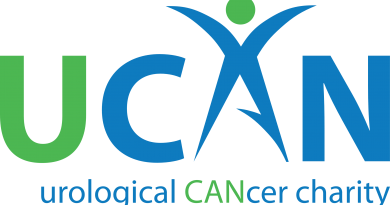Objectives
UCAN model of cancer care and support
Engaging patients in the design of support services
In September 2004, a process of consultation between consultant urological surgeons, consultant oncologists, urological cancer patients and their partners reviewed the needs of those affected by urological cancers in the context of existing care and support services. This consultation identified several areas where the improvement of services was needed:
-
better and more accessible information supported by scientific evidence to facilitate patients’ decisions about their care
-
better care for those affected by the adverse effects of cancer treatment
-
better support for patients and their families throughout their journey of care.
As a result of this feedback, a new Scottish Urological CANcer charity (UCAN) was founded as a partnership between urological health professionals working in Aberdeen Royal Infirmary and cancer patients and their families (http://www.ucanaberdeen.com). Since its establishment, UCAN has aimed to improve support for those affected by urological cancers, developing an array of services. Key among these services is a dedicated UCAN Cancer Care Centre co-located with the inpatient clinical services and offering access to various information tools and materials, as well as advice from experienced urological cancer specialist nursing staff. Other services include an online information site, an Internet forum for patients and their families, and a one-to-one peer support network matching newly diagnosed patients with ‘buddy-advisors’ who experienced a similar diagnosis. Another key activity of UCAN is raising awareness of the urological cancers through health promotion in the community as a way of encouraging early presentation when symptoms begin.
Through establishment of the UCAN Patient Advisory Group, the design and development of these services has evolved and continues to be planned and implemented in dialogue with patients and their families.
Championing an integrated approach to cancer care and support
UCAN support services form an integral part of the provision of urological cancer care in Aberdeen Royal Infirmary. Co-located with the inpatient urology ward and accessible at any time between 9 am and 5 pm from Monday to Friday, UCAN Cancer Care Centre is a non-clinical space which serves as a hub for patients, their families, and healthcare professionals involved in their care. The centre is also intended to serve as a drop in centre for members of the public seeking merely information about the urological cancers. The use of the centre and associated services is integrated with the patient care pathway and with key clinical appointments (including diagnosis and the first post-treatment review consultations) taking place in a dedicated room in the centre. The co-location of the UCAN Cancer Care Centre with the inpatient ward allows the use of this service by patients and their families at the time when patients are hospitalised while receiving treatments. The patients are also encouraged to visit the centre while undergoing any further investigations or minor procedures (such as the removal of the catheter after radical prostatectomy). Envisaged as a drop-in service as well as a site for formal consultations, UCAN Cancer Care Centre serves patients and their families as an anchor within the healthcare system, offering information and advice not only in relation to illness and treatment but also on the system, the processes of care and other available services.
The establishment of the UCAN Cancer Care Centre and associated services has had a direct impact on clinical practice, facilitating communication between patients, their families and healthcare professionals, as well as among patients and healthcare professionals. In particular, it has resulted in radical changes in the way a cancer diagnosis is delivered. Previously the breaking of bad news took place either directly on an inpatient ward, or more commonly in a busy outpatient clinic environment, offering patients and their families a limited time and only some degree of privacy. Currently, with the majority of diagnoses delivered in the UCAN Cancer Care Centre patients are offered ample time (as long as they want and need) and a private, non-clinical environment for breaking bad news, as well as immediate access to informational and emotional support from the experienced staff that work in the centre. Since its opening in February 2008 the UCAN Cancer Care Centre has been widely used by patients and their relatives. In particular, 1100 diagnoses have been delivered in the facility and the number of drop-ins has reached 18,899.
Uniting research and practice
The development of UCAN support services have been informed by clinical expertise as well as patient experiences. At the same time, recognising the fact that the design and improvement of effective services needs to be informed by research evidence, UCAN – in partnership with the University of Aberdeen and NHS Grampian – secured funding from such organisations as the Big Lottery Fund, Macmillan Cancer Support and the NHS Grampian Endowment committee to address the gaps in knowledge related to the provision of urological cancer care and support.
In response to the first key need identified by the consultation with clinicians, patients and their partners – the requirement for better and more accessible evidence based information for patients – a research programme has been developed to address the gaps in evidence on the effectiveness of available treatments for different urological cancers, to examine existing models of information provision, and to inform the development of information materials for patients diagnosed with urological cancers. A research team placed within the Academic Urology Unit at the University of Aberdeen have conducted a number of systematic reviews appraising the effectiveness of treatments for localised prostate cancer, advanced renal cancer and localised renal cell carcinoma. This work is being undertaken in collaboration with the urology professional organisations, such as British Association of Urological Surgeons (BAUS) and European Association of Urology (EAU). The findings from this work will help inform clinical practice guidelines for treatments of urological cancers (i.e. localised renal cancer) produced by such organisations, thus influencing professional practice and ultimately patient care. A separate review conducted by members of this team explored current evidence related to information provision in cancer care, providing evidence-based recommendations to inform the development and evaluation of effective information services for urological cancer patients.
A related research programme was been commissioned to examine patient experiences of urological cancer care and to identify further support needs with the aim of improving services available to urological cancer patients, as suggested by the third key message from the consultation between healthcare professionals, patients and their partners undertaken in September 2004. Researchers from the Academic Urology Unit at the University of Aberdeen conducted a review of literature on the way couples approach decision making in relation to treatment for prostate cancer. A qualitative study was also conducted to evaluate the support services provided by UCAN. The results from this study informed the subsequent re-design of the UCAN peer support service. Recently, an independent audit was undertaken by the NHS Grampian Clinical Effectiveness Team to appraise the quality of UCAN services.
Responding to individuality of patients’ values, needs, preferences and experiences
UCAN activities are underpinned by the recognition of the fact that cancer patients, as individuals, have varying values, needs, preferences and experiences. Support services provided by UCAN in partnership with NHS Grampian have been designed to address these differences and to provide tailored care and support to those affected by urological cancer in an appropriate form and at an appropriate time. The newly diagnosed urological cancer patients are introduced to the UCAN Cancer Care Centre at the outset of their journey, usually at the time of the diagnosis consultation held directly in the centre. During this first visit, patients are introduced to the experienced urological cancer specialist nursing staff who work as coordinators in the centre and to its services. The initial conversation gives the staff opportunity to assess individual needs and concerns of a patient and to offer appropriate support. Any subsequent visits to the centre provide further opportunities for reassessment resulting in all support being given directly in response to patients’ individual needs and concerns. Although patients and their families are routinely introduced to different services offered by UCAN, the decision whether to use any of them is made by patients themselves as and when they choose.
An important aspect of UCAN services is the flexibility of the Cancer Care Centre, linked to its function as a drop-in facility accessible to patients outside the times of the formal clinical appointments. Patients are actively encouraged to visit the centre at times convenient to them or when a particular need arises. They are also offered a possibility of contacting the coordinators via an answer telephone service, through email or an online discussion forum.
Recognising the dynamic character of patient needs and preferences for cancer support
The flexibility and responsiveness of UCAN services is linked to the recognition that patients’ needs and preferences for cancer information and support are dynamic and unfold alongside patients’ individual experiences of illness and care. The issue of the appropriate timing of the delivery of support is therefore essential. An integrated approach to urological cancer care adopted in Aberdeen Royal Infirmary (NHS Grampian) with the significant input from the UCAN Cancer Care Centre and associated services facilitates a timely provision of support at the essential points in the patient cancer journey. With crucial clinical appointments taking place in the UCAN Cancer Care Centre, clinicians and UCAN coordinators are able to provide the necessary support or signpost to other available services at times when it is most needed and appropriate. Making the centre and associated services available to patients outside of these formal appointment times opens further opportunity to match the support provided with patients’ individual needs as they unfold alongside patients’ experiences of illness and care.
The introduction of a one-to-one peer support network by UCAN recognises the dynamic of patients’ growing knowledge and understanding of their illness, and their need and willingness to share their experiences and expertise. As patients move through their cancer journey from the point of diagnosis and treatment to the recovery and rehabilitation stage, they are invited to act as ‘buddy-advisors’ and to offer information and support to the newly diagnosed patients facing similar experiences and issues.
Recognising the need for a system of support services
The responsiveness of UCAN services to patients’ individual needs, preferences and experiences is also expressed in a wide array of support tools offered to patients. The focal point among these tools is the UCAN Cancer Care Centre as a dedicated non-clinical space for support for urological cancer patients and their families. The centre provides a private and relaxed environment for the appointments with consultant urological surgeons and with the nursing staff, as well as for the less formal interactions with healthcare professionals, other patients and family members. In addition to the physical space, the centre offers access to the expert advice of dedicated staff – specialist nurses acting as service coordinators – as well as to a wide range of information tools, such as patient information leaflets and books, clinical charts and models, patient information CDs and DVDs. Patients can also receive training in the centre on use of the dedicated forum as the centre has a number of computer stations for patient use.
The UCAN Cancer Care Centre acts as a contact point for the associated support services. On their first visit to the facility, patients are given information packs which outline the range of services which are offered and emphasise that these services can be accessed at any time-point in their cancer journey. As part of these packages, patients receive details of and access to the remote tools, such as an Internet website and a password protected discussion forum for patients and their families. They are also introduced to a one-to-one peer support network matching newly diagnosed patients with ‘buddy-advisors’ who experienced a similar diagnosis. As and when required, patients are also signposted to additional sources of information and support offered by other institutions and organisations.
The introduction of patients to this variety of services is underpinned by recognition of the fact that their individual needs and preferences may be addressed by particular information and support tools, or by a combination of different tools, and that patients can play an active role in determining which type of support best suits them. It is also based on the understanding that patients may opt not to use the services offered to them but value them as a ‘safety net’ should any future needs arise.
Recognising an active role of healthcare professionals as educators
A diagnosis of cancer gives rise to a multitude of support needs, while at the same time confronting patients with a significant amount of information related to their illness and processes of care that largely remains outside of their previous experiences. UCAN support services are underpinned by recognition of the fact that making information simply available to patients may not be sufficient to address their arising needs, and that expert help and guidance in accessing and interpreting information may be required.
The UCAN Cancer Care Centre offers patients direct access to caring clinician teams and experienced centre coordinators providing tailored informational and emotional support. The provision of information is not limited to handing over particular information leaflets, books or audio-visual materials. UCAN coordinators take up an active role as expert guides and interpreters. They assess patient knowledge and understanding, as well as their needs. In response to these assessments, they indicate and explain key messages raised by the appointments with caring clinician teams or included in the patient information literature. They also direct patients to additional support services. In doing so, UCAN coordinators take active role as educators assisting patients in their navigation of their care pathway, and of the healthcare system in general.




